The document of the Magna Carta itself was real. That’s about it.
And here it is.

That’s what the fuss is all about? 😉 It’s a document of supreme national importance, isn’t it? One that directly led to the creation of the Human Rights Act of 1998?
Sort of, and yes: kind of…
But that’d be a very short blog post, so let’s go into what this thing is-that just 10 weeks after its creation failed spectacularly and was annulled by the Pope,
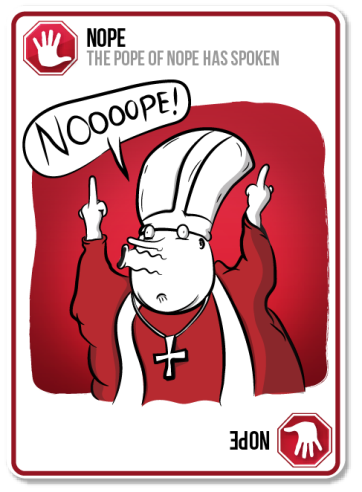
plunging the country into civil war– and how come this document has such power when all but three tiny parts have not been part of law since 1863, when the Statute Law Revision Act repealed 17 of the last 20 clauses (sections/ sentences/ paragraphs) from the Magna Carta that remained ‘legal’.
So what’s left?
- clause 1 confirming the liberties of the English Church
- clause 9 confirming the liberties and customs of the city of London and other cities, towns and ports (1215 clause 13)
- and clause 29 concerning the rights of free men and the administration of justice (1215 clauses 39 and 40).
What does that mean? Doesn’t seem to deserve all the attention it gets as a call to arms for whatever political side is trying to use it (and it was ever thus!)
Clause 1:
This law remains as a hangnail from when pesky kings tried to force appointments for church bigwigs onto the Church for political gain, and tried to find ways of skimming revenue from them. They didn’t like that much (!) so the clergy at the time ensured that when the Barons (will explain them later) pushed King John into signing this document, that they too would ‘get their cut’ of power augmenting and tax avoidance.
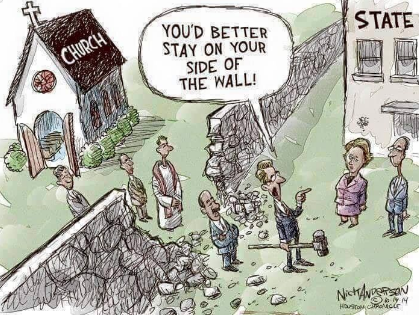
This was part of a power struggle between King and Church that had been boiling for over a century, since the Normans’ arrival (1066).

Churches now stood on what was once nobles’ land. But that land was only given by that noble to have an ‘in’ on who actually ran those churches for the Church (and yes, some thought it was a way to ‘get God’s ear’ as it were, but for many, it was all part of the game of politics and power). So this part of the Magna Carta was all/just part of a move for reform of the Church whose functions had been suppressed and controlled by the Normans for too long. Of course no King would give up that stranglehold on what had become such a wealthy and powerful institution, so no quarter was given on either side till King John was basically forced into signing this document. (A full history of the Church would need an entire book, not a blog, but the links on here do explain it a little more…)
So while words like ‘freedom’ are waved around in this clause, it comes down to what it always come down to: power and money.
Why might this clause not have been abolished?
Have a think about why indeed did it start out and remain the VERY FIRST ITEM OF IMPORT in a document that allegedly changed the face of English kingship (did it? “Ish” is the short answer, as the institutions did not change-the feudal system was still a thing.
Why?
Because the nobles had no interest whatsoever in any kind of social justice for anyone but themselves. It was King John’s excessive use of money gathering they had issue with, not the money gathering itself!)
Clause 9:
Now clause 9 is trickier. Originally clause 13
It was part of a set of clauses concerned with debtors who owned and/or controlled land with all types of legal status and use. Nine, most commentators agree, implies a move to restrict what can be taken to cancel debts, and/or strike out debts owed to the King, whether actual or exaggerated by overzealous royal debt collectors. Having the goodwill of London was something no King of this era could ignore, and if they did, they regretted it. They could, quite literally, especially with the rise of the merchant classes and the accompanying development of not only mercantilism, but also Europe-wide trading leagues/associations who were powerful and cantankerous (yet another social system, and one that arguably created part of the middle classes) and could lock the King out of his own capital, just as the Barons did to John! Going through the gates into the city was the very symbol of being England’s true king! And each gate had a long history and had acquired much importance in the minds of those who lived there. Not forgetting that many nobles, including King John’s closest associates, were in hock to the king and his moneylenders by 1215. So this desire to restrict the king’s power to take money from nobles and wealthier merchants was the driving force behind this clause.
Alongside this were multiple clauses on how to avoid owing money to Jewish moneylenders. So this section of the Magna Carta was to ‘redistribute’ the wealth- but away from the poor; ‘not English’ or ‘Christian’ (remember this was the time of The Crusades where Christians basically went on a journey to ‘save’ land they deemed holy from those who they felt did not deserve to hold it and John’s rather more popular at the time brother Richard I The Lionheart had made his name Crusading); and the king and into the nobles’ pockets, whether those nobles owed that money or not. (To explain the significance of this, and what is actually a massively explosive topic of paying interest on loans (seen as usury by Christians and still deemed both illegal and extortionate) would require another blog, so will stop here. The problem is though,
with damaging stereotypes resulting that still exist to this day.
The Magna Carta was not this beacon of democracy and hope- the fact that a bunch of 25 nobles saw fit to include such a thing in a document that was supposed to only be about curtailing the overbearing power of the King speaks absolute volumes. As does the fact that only ONE THIRD of the clauses were even about restricting the king’s powers!) It is the still-living definition of a conservative piece of legislation.

Looks like it’s about power and money again.
Why might this clause not have been abolished, when 10 and 11 above went 150 years ago?
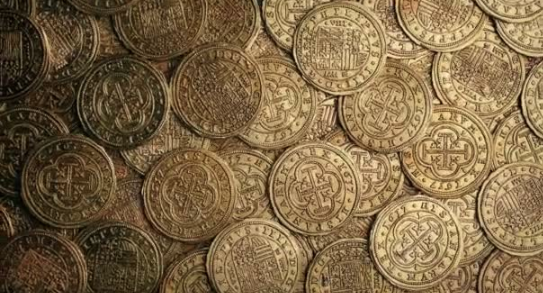
Just who were the Barons anyway?
They were simply the head of the faction of the nobles who rebelled against the King. A bit like when Rees-Mogg declared he wasn’t going to vote for May’s EU deal but is now, in his ‘man of the people’ persona…

This document was the hasty result to attempt to resolve a bitter civil war (failed) that not only immediately fell apart but John was dead within the year anyway. For a full list of their names, ranks and titles on both sides go here, if that’s your thing 🙂
But it’s more the why than the who. And as if there’s only ever one faction or reason for a rebellion!
Here is no different.
- Some were simply p*ssed off that John had cacked up the (never ending) war with France. This meant there was no land grabbing back in the ‘old country’, no French nobles to ransom for £1000s, and no good ol’ looting to be had
- Some were angry about how John had overridden the Pope in appointing top bishops (yes, this used to be very important, yes, this should be another blog!) and taking the money from lands owned by bishops who’d gone into exile
- Some were aggrieved about John’s deteriorating relationships with Europe, which were affecting trade (yes I know, whilst also being happy to pillage…this is the art of diplomacy for you!)
- Some were all about that tax avoidance
- Some wanted more power while in their own lands…
I’m not seeing any ‘for the people’ stuff yet, are you?
Clause 39 and 40:
“To no one will we sell, to no one deny or delay right or justice.”
Ok this– this is the biggie. The bit people™ *mean* when they start talking about the Magna Carta.
And of course when you read it, it sounds great!
Rights for all!
Woohoo!
This is the bit used to justify the rights of man on the left (as this blog is attempting to deconstruct), and to justify hate speech disguised as free speech on the far right.

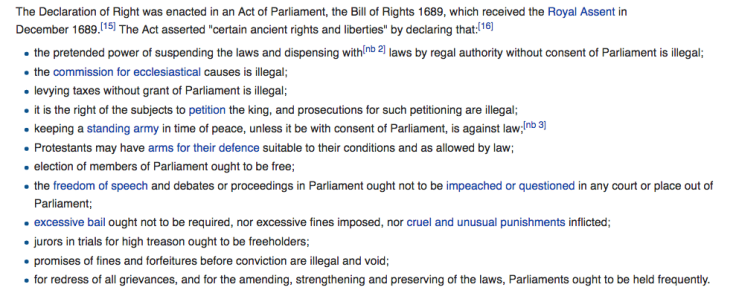

But let’s dig deeper. Again, this could be a very short blog, or at least section of this blog as the keywords are ‘free men’. The rights and enjoyments are for ‘free men’ alone. Thus for many, the rest was moot. For this we have to look at feudalism, handily summed up in this pyramid.

But to cut a long story short- serfs were not classed as free. And while it’s hard to work out what percentage of the population were serfs in the time of King John (the census didn’t exist till 1801) and the Domesday Book of 1086 (the first ‘census’, but was really a tax gathering survey) only contains records for 13,418 settlements- 40% of the listings given were for unnamed and ungendered serfs, called villeins or ‘villans’ in the Book. Like today’s polls, 40% of 13,418 respondents would be seen as a good sample size to be able to say with some confidence that almost half of the population in King John’s time were NOT free men. To top it off, 10% of those on the list are outright called slaves.
Some sources have it as barely one in seven of the (male) population would benefit from the terms of the Magna Carta.
We can also see that it would be another century at least before serfs were seen to have been mostly absorbed into the free peasantry class, usually (as well as the aforementioned mercantilism, also) due to mechanisation and putting smaller land plots together (and yes, this needs its own blog too!).
- They were not paid. Nor holiday pay, sick pay, weekends, maternity leave, bank holidays…
- They had no choice when to work or for how long, and ‘lunch breaks’ let’s say weren’t ‘standardised’…
- Their labour was their only ‘currency‘.
- They could not even permanently leave their holding or village without their lord’s permission!
- it took a countrywide plague in 1349 for them to acquire any rights as we’d understand them, which were swiftly clamped down upon by 1351.
So while the rights themselves are clear, detailed even, with provisos and sub clauses, they only applied to a maximum of 60% of the population- but far more likely to be closer to the above lower figure of 14%- and then in degrees depending on where you are in the above feudal pyramid. Thus while you had the perhaps incongruous fact of what we might call peasants not being able to read and write, but being very well up on contract law as it applies to land-knowledge that was imbedded in the culture of the lower working classes since well before any Normans even sniffed these shores– knowing the law was not the same as being able to expect equal treatment from it. Any ‘justice’ even the free villeins might seek only came the courts of their own lords, who were usually the transgressor in the first place! Even with lords that did observe their legal duties, court cases only were held every month at most and if you wanted to appeal to the king’s representative (or Eyre) at the assizes court it could take you seven years or more before you saw a judge! We see this weaselese when it comes to the poor throughout history. Add to this there was still trial by ordeal in John’s time, and ‘free men’ never sounded so hollow. (Yes, it’s as awful as it sounds!)

Compare this to the withdrawal of Legal Aid today. We only had it for 55 years as it was! First introduced in 1949, as a principal pillar of the welfare state; its reach was almost universal with 80% of British people eligible, but was cut to limit access to less than 1 in 3 by 2008, further in 2014, and had the budget slashed by a further £220 million per year from 2014. Without this, you have a two tier legal system- one for the rich and one for the poor.
Considering this didn’t exist in John’s time, how many ‘rights’ do you think anyone not rich actually received?
Looks like it’s about power and money again. Not only that, but to establish in the cultural consciousness the ‘rightness’ of the society that created the system behind the power and money.
Why might this clause not have been abolished?
The Magna Carta did not give rights to ‘the people’.
It never pretended to. It was
- a simple power grab by the nobles taking advantage of someone who, by the standards of their time, was a ‘weak’ king (he wasn’t; any more than Richard killed the ‘Princes in the Tower’; but that too is the story of another blog!)
- a chance to kickback for their allies (the Church officials backing the proposal) with some extra cash and land
- a chance to dig themselves out of some financial holes that for the most part, were of their own creation.
- initially a total policy failure, and only became part of English law at all due to the death of John and his son (Henry III) being an infant king. The ‘regency’ at the time (made up of…*gasp* nobles) ruling on behalf of the young boy brought it back into law, and there it stayed. It was not the calming draught of peace orators suggest- it took till 1225 and a written promise from the king that it was not coerced but freely given, for it to stick.
- and finally- and above all- an examination in macrocosm of middle Norman feudal society and as such has social inequality built into every aspect of its existence
But over the time the message
-nobody should have ultimate power, not even those behind the drafting of the Magna Carta-
has been obscured and damaged by spin. If anything, it is a snapshot of the inequality upon which this country was built, and the sooner it is abolished entirely, the better.
Basing any political rhetoric, on the left or right, on this document is just maintaining the status quo.
So let’s just stop, and make our own social contract instead!
Like ‘Great’ Britain, as glorified below by Ed Husain in the Telegraph, the ‘Magna’ Carta only means great as in ‘the bigger one’.
The former was to avoid confusion with Brittany in northern France: the latter to avoid confusion with the other, accompanying Charter of the Forest, which gets no press at all!
Probably because it concerns
- actual rights of access without charge to so-called royal lands for ‘free men’ (yes I know, this issue again…)
- the abolition of instant (no courts) vicious and draconian punishments for anyone who poached from the forests
- the complete return of some of the lands stolen from the populace by the Normans
- the right to build on and farm all those lands for many more people, of all classes.
Why do you think this Charter is ignored?
Lack of a catchy title? Lack of some bloke in a slick and shiny silver suit (of armour) to tell enough people it was a good idea?
They were seen as completely linked and part of the same ‘bill of rights’ as the Magna Carta…at the time, by Henry III and by the nobles who agreed to stop rebelling in response to its return. Copies by the hundred had been sent out, and read by all who could read, and read to all those who could not.
Their idealism compared to what they had caught what we refer to today as a public mood.
BOTH Charters did.
It went back to a ‘good old days’ when everyone from kings to the local leader were elected and ‘everyone had a say, land to call their own and a choice as to whether to be called on to fight’- namely: Saxon and ‘Viking’ times; and of what became common law before the Norman invasion that changed life so unrecognisably 150 years previously. This over simplified and beautified vision of times gone by helped, and still helps to fuel an emotional response. The myth of the Magna Carta quickly outgrew the fact. And we hear people speak of common law as being as untouchable as properly codified law to this day.
As time went on, the number of barons in depictions of the signing has risen more than attendants of the first Sex Pistols gig! And the king is depicted less and less as lounging, a bit fed up and maybe bored; and more at a ritualised and far more serious looking ‘lower level’ than the knights that surround him.
Such symbolism has always worked!
Compare the painting at the top of the blog to this:

Why do you think people do this? Does it remind you of anything? How about Theresa May’s doctored photo shoots on the general election ‘campaign’ in 2017? 😉 Look at where May is on the second photo compared to the first as well, and how much of the photo she now takes up…
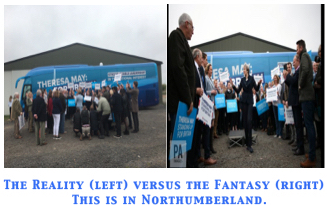
If you’ve been played by the Magna Carta rhetoric, you’re not alone! As I’ve said, all political wings have been known to use its imagery and association to rally for their causes. I’ve had ‘Magna Carta’ mutters on more than one occasion, before I had a dig…
However, when it’s used to describe some kind of essential ‘Britishness’ to which all ‘decent’ people must agree and follow? I think not. This law came from Norman (French/ Dane) elites trying to rein in the Norman who happened to be King of said elites. This country was barely beyond being called ‘England’ (well, Angleland or Angland) by John’s time, let alone any kind of union in law of Scotland, Northern Ireland, Wales and England! The ‘confidence’ Husain talks of below in the Telegraph (January 2019)? Basically a complete revision of the history of the British Empire, the ‘laws, liberties and language’ he lauds hiding the brutality, oppression and slavery upon which it was built. So, that’s a massive nope from me. No, Mr Husain, the ‘guilt’ is not ‘misplaced’ 🙄 or only felt by (implied by the language in it such right wing tropes as) liberal bleeding heart anti-patriot do-gooder types *sigh*
because you can love your country without loving the oppressive systems that still exist in this country; and you can want to improve it for more than just the descendants of those twenty five barons who forced the King to sign it 804 years ago.
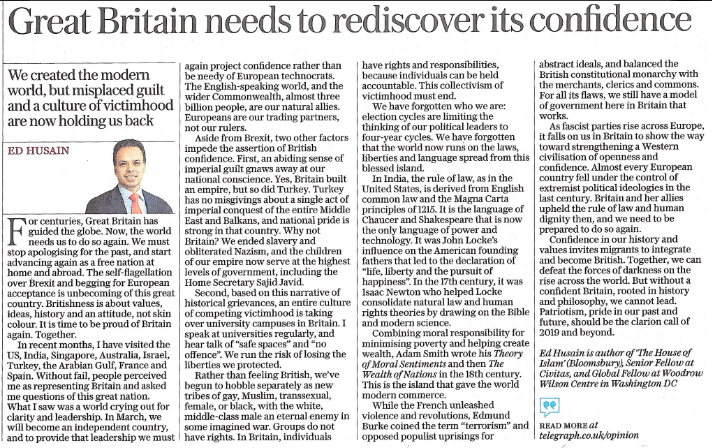
So enough is enough.
If we need to care about any Charter at all, let it be the one of the Forests.
And let’s finally put the Magna Carta to bed.

Leave a comment